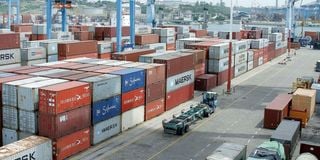
Cargo containers at the Port of Mombasa.
The High Court in Nairobi has stopped the government from interfering with the contracts of Autoports Nairobi Freight Terminal and Compact Freight Systems, noting the duo will continue to handle cargo destined for South Sudan through the Port of Mombasa.
In his judgement, Justice Alfred Mabeya said the South Sudan government’s decision to authorise the pair to handle, store, and store cargo destined for South Sudan through via Mombasa cannot be contested in Kenyan courts.
The court said the government’s actions infringed on the petitioners’ economic rights and their right to administrative actions that are timely, efficient, lawful, fair, and in accordance with due process. "In the premises, the court finds that the decision of the government of South Sudan appointing the petitioners as the legitimate companies designated to offer handling, storage and warehousing services for cargo bound for South Sudan through the Port of Mombasa cannot be challenged in these proceedings or in the Kenyan courts," Justice mabeya said in the decision issued on September 13, 2024.
However, the court declined the petitioners’ request to extend the cargo management period to 10 to five years, instead capping it at seven years.
The petitioners went to court challenging actions by the Ministry of Industrialisation, Trade, and Enterprise Development attempting to alter an existing agreement allowing them to handle South Sudan-bound cargo. They told the court that they were authorised by the Kenya Revenue Authority to operate Container Freight Stations (CFS).
They said the Ministry of Roads and Transport and the Kenya Ports Authority had granted them permission to manage and warehouse all imported general and containerised cargo destined for South Sudan.
Autoports Nairobi and Compact Freight also informed the court that they had been appointed by the South Sudanese government, through a letter dated November 9, 2022, to manage cargo destined for their country.
This arrangement, according to the petitioners, had been in place since 2013 and was crucial for security and efficient customs management. They said they had invested over Sh1 billion in infrastructure, machinery and human resources to fulfill the mandate.
They contended that the directive from the Ministry of Trade, which sought to undermine this arrangement, violated their constitutional rights, including socio-economic rights under Article 43 of the Kenyan Constitution. The petitioners sought a court declaration that the directive was illegal and that they should be granted a 10-15 year period to manage the cargo, to recoup their investments.
Respondents argued that the government of South Sudan was not the owner of the goods passing through Mombasa and that importers were free to choose their preferred CFS. They further claimed that the petitioners’ attempt to monopolise cargo handling services was unfair and would harm the interests of other CFS operators.
Further, the respondents questioned the validity of the letters from the South Sudan government presented by the petitioners, claiming they did not meet the necessary evidential standards under the Kenyan Evidence Act.
In delivering the judgment, Justice Mabeya emphasised the principle of sovereign immunity, noting that decisions made by the South Sudanese government regarding the handling of their cargo could not be challenged in Kenyan courts. He pointed out that South Sudan’s directives on how its cargo should be handled, including limiting the number of CFSs, were matters of national security and must be respected.
“It is clear that in restricting the number of CFSs to handle cargo destined to that country, the government of South Sudan was concerned by its own internal considerations including security as a government. That is a decision that must be respected. It can only be dealt with or challenged through diplomatic channels and not judicial process,” Justice Mabeya said.
The court ruled that the South Sudanese government had a legitimate interest in overseeing its cargo to ensure security, and that the respondents’ directive was contrary to international law principles governing relations between sovereign states.
The court also found that the respondents’ actions violated the petitioners’ rights under Article 47 of the Constitution, which guarantees fair administrative action.





